With just under three weeks to go until the 2023 Rugby World Cup kicks off in Paris, we're looking back at the history of the tournament from its origins in New Zealand and Australia 36 years ago, to its tenth instalment in France next month
This week, we're looking back at the 2011 tournament that was held in New Zealand for the second time.
The hosts eventually ended a 24-year drought to claim their second Webb Ellis Cup with a narrow and nervy win over France - a final that lives in folklore with the winning kick coming courtesy of a fourth choice first-five eighth who was enjoying his holidays when the All Blacks were hit with an injury crisis.
The Hosts
New Zealand saw off competition from Japan and South Africa to win the hosting rights for the first time since 1987.
They had, in fact, been in for the 2003 edition alongside Australia but disagreement over naming rights meant that the bid never progressed.
There were concerns in New Zealand about the costs associated with hosting a one-off tournament and the value to the economy but these obstacles were overcome.
Originally 13 venues were to host the 20-team competition but the Christchurch earthquake, which occurred in February 2011 and killed 185 people, meant that five pool games and two quarter-finals were moved out of the South Island city by organisers.
Both the Forsyth Barr Stadium in Dunedin and Eden Park in Auckland were redeveloped for the tournament, with Eden Park hosting the final in front of a capacity crowd of 61,079.
Russia were the only tournament debutants, while referee Alain Rolland and assistant referee Simon McDowell officiated in the competition
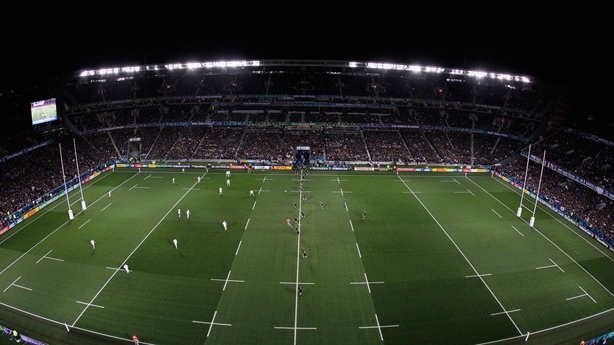
The story of the Rugby World Cup: South Africa win in 07 as Ireland collapse
Pools
Pool A: New Zealand, France, Tonga, Canada, Japan
Pool B: England, Argentina, Scotland, Georgia, Romania
Pool C: Ireland, Australia, Italy, United States, Russia
Pool D: South Africa, Wales, Samoa, Fiji, Namibia
The story of the RWC: Jonny Wilkinson kicks England to glory in 2003
Ireland
Where does Ireland's 2011 quarter-final exit rank in the pantheon of World Cup disappointments?
Given the shambles of 1999 and 2007, it's not in the top division but in terms of blowing a seemingly great opportunity to make it to a semi-final, it's still up there.
For four long years Ireland had waited to put the wrongs of France 2007 right.
That latest showing had recalibrated expectations and despite winning a first Grand Slam in 61 years two years previous, Ireland, under head coach Declan Kidney, had somewhat stalled and expectations were never excessive.
The spring's Six Nations campaign didn't really take off with a late Ronan O'Gara dropgoal needed to see off Italy and a home defeat to France signalling a barren spell ahead.
An away defeat to Wales ended any lingering hope of another title win but the campaign did end on a high with a 24-8 slam-buster against England on the final day.
If the side had hoped that would provide some sort of springboard into the summer warm-ups they were left sadly mistaken and they suffered four defeats, to Scotland, France twice and England, the final game also saw flanker David Wallace ruled out of the tournament with a knee injury.
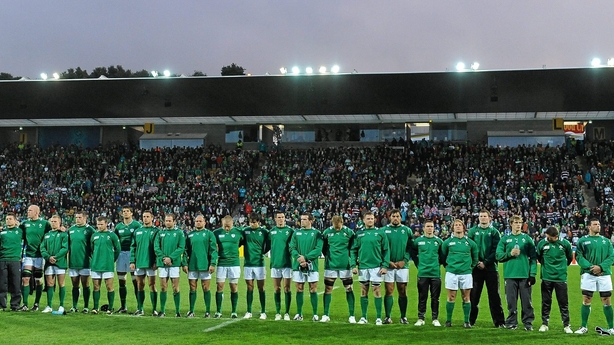
A thoroughly unconvincing 22-10 first-round win over the United States, with former Ireland boss Eddie O'Sullivan at the helm, did little to ease the concern but that was all to change in the following game as Ireland claimed their first ever World Cup victory over a southern hemisphere powerhouse.
Ireland and Australia were level at 6-6 after a tight first half, memorable for Stephen Ferris' huge tackle on Aussie scrum-half Will Genia.
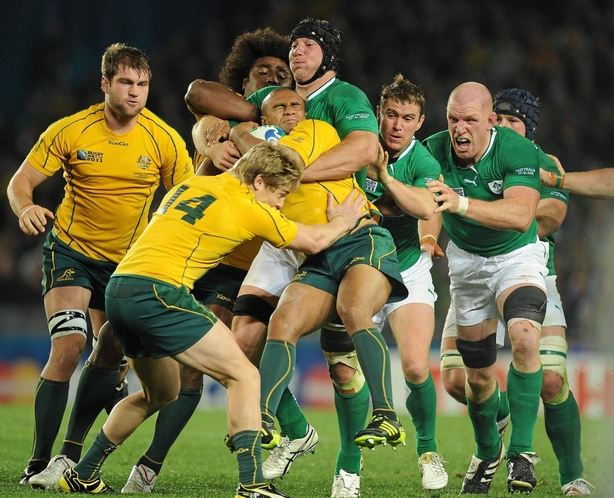
Johnny Sexton added a third kick before being replaced by O'Gara, who landed two more penalties. Australia applied huge pressure on the Irish line but a brave Tommy Bowe intercept lifted the siege and Ireland had a notable World Cup scalp.
Well and truly up and running, Ireland scored nine tries against Russia and finished off the group stages with a comprehensive 36-6 win over Italy.
However, the quarter-final curse was to strike again, this time in Wellington.
Wales had finished second in Pool D behind South Africa and Ireland's recent record against the Welsh was more than decent; buoyed by the win over Australia and subsequent victories, Ireland, with Brian O'Driscoll as captain, expected to get the job done.
Warren Gatland's side took an early lead and although a converted Keith Earls try had Ireland level in the 45th minute, it was the Welsh who finished the stronger, running in two tries from Mike Phillips and Jonathan Davies to seal the win.
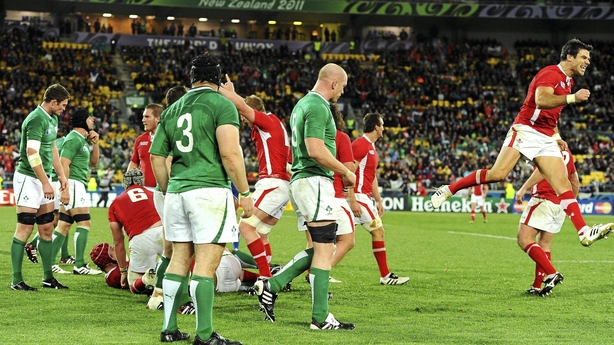
Ireland's players looked stunned, it had happened again. O'Driscoll later rated the loss as his "biggest regret".
A World Cup semi-final place, against a France side that had already lost heavily to New Zealand and 19-14 to Tonga, belonged to Wales.
Ireland squad: Rory Best, Seán Cronin, Damien Varley, Tony Buckley, Tom Court, Cian Healy, Mike Ross, Leo Cullen, Donncha O'Callaghan, Paul O'Connell, Donnacha Ryan, Stephen Ferris, Shane Jennings, Seán O'Brien, Jamie Heaslip, Denis Leamy; Isaac Boss, Conor Murray, Eoin Reddan, Ronan O'Gara, Johnny Sexton, Gordon D'Arcy, Fergus McFadden, Brian O'Driscoll (capt), Paddy Wallace, Tommy Bowe, Keith Earls, Andrew Trimble, Rob Kearney, Geordan Murphy.
Results
Pool C: Ireland 22-10 United States (11 September – Stadium Taranaki, New Plymouth)
Pool C: Ireland 15-6 Australia (17 September - Eden Park, Auckland)
Pool C: Ireland 62-12 Russia (25 September - Rotorua International Stadium, Rotorua)
Pool C: Ireland 36-6 Italy (2 October - Otago Stadium, Dunedin)
Quarter-final: Ireland 10-22 Wales (8 October - Regional Stadium, Wellington)
The story of the Rugby World Cup: Aussies party like it's 1999
A home World Cup came at a perfect time for New Zealand, who had been set to add to their 1987 win in almost every renewal before heartbreaking and surprise defeats, in the final in 1995, and then in knock-out stages, France their bogey team in 1999 and 2007.
But it also came with added pressure and that pressure slowly built up as the tournament progressed.
Between an extremely unfortunate run of injuries and a disciplinary issue within the squad, the All Blacks didn't make life easy for themselves.
They certainly had their fun in the pool stages, scoring 36 tries in seeing off Tonga, Japan, Les Bleus and Canada.
Captain Richie McCaw recalled a French player saying "we'll see you in the final" following their 37-17 victory.
However, a training-ground groin injury ended star out-half Dan Carter's tournament prior to their final pool game and in came Colin Slade.
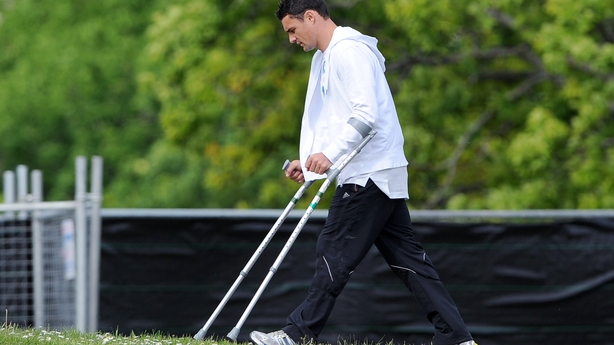
Amid all this, backs Israel Dagg and Cory Jane - who scored three tries between them against France - decided that three days before a quarter-final against Argentina would be as good time as any to go on the lash, the merry duo were spotted in an Auckland bar enjoying themselves a little too much.
"They are the ones who are going to face the consequences now because they are going to be known - particularly across the country - as the guys who let the team down," said team manager Darren Shand.
All the time, the talismanic McCaw was nursing a stress fracture in his right foot and playing through the pain.
Still, Graham Henry's side had too much for the Pumas, who had effectively knocked Scotland out with a 13-12 pool victory, and ran out 33-10 winners but the victory came at a cost with Slade suffering a groin injury in the first half and experienced centre Mils Muliaina injuring his shoulder.
Now dearest rivals Australia, champions in 1991 and 1999, stood between the hosts and a final.
The Wallabies had won the shortened Tri-Nations that summer, a title win that included a 25-20 victory over New Zealand in Brisbane.
However, an early Ma'a Nonu try set the All Blacks on their way to a 20-6 success.
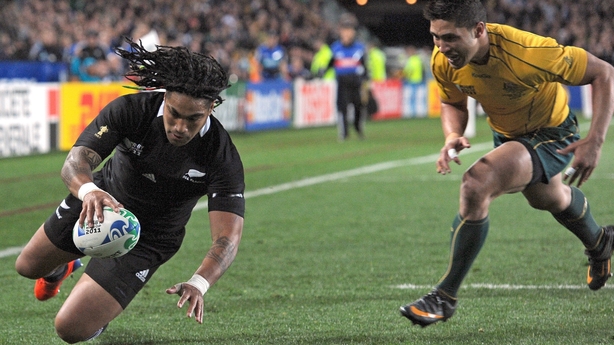
France, meanwhile, under head coach Marc Lièvremont had recovered from two defeats in the pool to see off England 19-12 in the quarter-final and then Wales, who had captain Sam Warburton sent off by Irish referee Alain Rolland early in a 9-8 loss.
Aaron Cruden had been the next cab off the rank at out-half but he went down in the first half of the final with a knee injury and was replaced by Stephen Donald, plucked from a fishing trip on the Waikato River to make up the numbers.
Tony Woodcock's 15th-minute try had given the All Blacks, whose scrum-half Piri Weepu had missed two kicks, a 5-0 lead with Donald kicking what turned out to be the winning penalty six minutes into the second half.
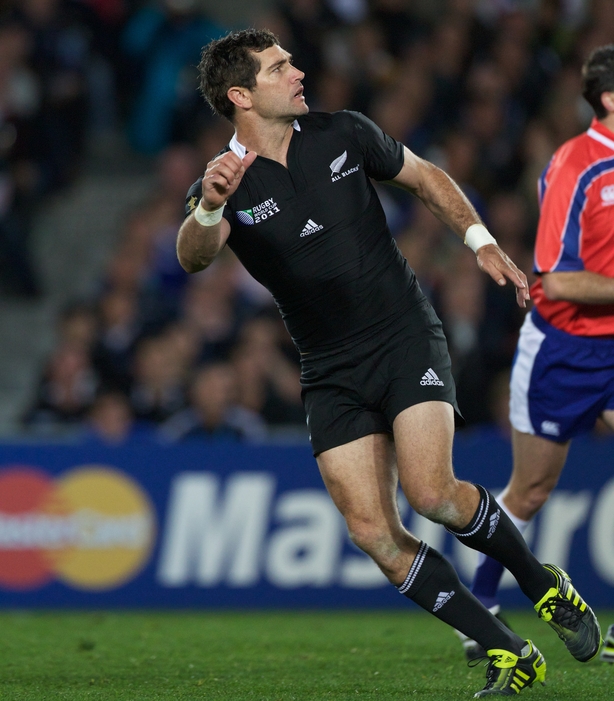
France, who had beaten England and Wales in the knock-out phase, hit straight back with a converted Thierry Dusautoir try but New Zealand held out, surviving as Francois Trinh-Duc connected poorly with a late long-range penalty.
"Horrible watching," commented McCaw later as the game turned out to be an arm wrestle. New Zealand didn't care as they claimed their second World Cup title.
"I'm bloody glad it did [go to the wire], because it tested us, we got to see if we could handle that moment," McCaw told Stuff.
"The fact that we got through, that changed the outlook on the All Blacks – that they may be the best team but can’t win a World Cup."
And there was still more to come.
Top points scorers:
Morné Steyn (South Africa): 62 points
James O'Connor (Australia): 52 points
Kurt Morath (Tonga): 45
Top try scorers:
Chris Aston (England), Vincent Clerc: 6 tries
Keith Earls (Ireland) Adam Ashley-Cooper (Australia), Israel Dagg (New Zealand): 5 tries
Listen to the RTÉ Rugby podcast on Apple Podcasts, Soundcloud, Spotify or wherever you get your podcasts.
Watch live coverage of Ireland's Rugby World Cup warm-up game against Samoa (26 August) on RTÉ2 and RTÉ Player, listen to live commentary on RTÉ Radio, or follow a live blog on RTÉ.ie and the RTÉ News app.


